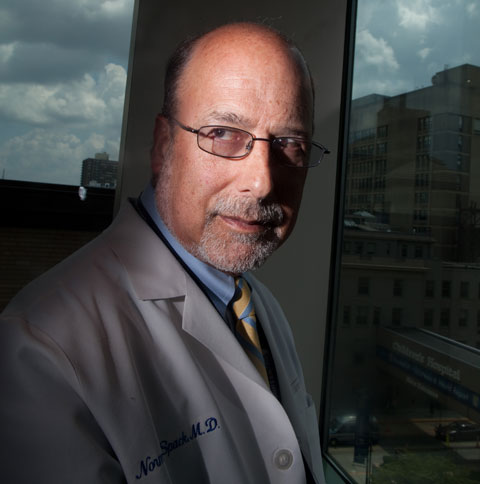
THE DOCTOR IS IN "Gender dysphoria is a condition that can be treated rather easily," he says. "You
don't need to be a rocket scientist to take care of a transgender patient." |
A
t 20, Norman Spack learned the power of hormones. By adjusting the prolactin and thyroid levels of tadpoles, Spack found he could prompt metamorphosis; he watched from a bench in his research lab as they grew legs and their gills were absorbed and replaced with lungs.Forty years later, a patient named Mark walked into Spack's adolescent medicine clinic in Chestnut Hill and told Spack he wanted to change. He was male, he told Spack, but his body was a woman's.
Back then, in the 1980s, many doctors might have seen Mark's predicament as a mental-health problem: someone with a desire that challenged the status quo of society and gender must need a psychiatrist, not an endocrinologist. But Spack approached the personable young man in much the same way he had approached his research on newts: Mark had a practical problem, and Spack had the tools to address it. "I had given plenty of testosterone to hypo-gonadal males," he recalls. "It just seemed to me you'd give the same amount you'd give a guy." And that's what he did.
Now nearing 70, and at the edge of retirement, Spack has gone on to change how transgender kids are treated. When he founded the Gender Management Service, or GeMS, at Boston Children's Hospital in 2008, it was the only pediatric clinic of its kind in the US. Adapting protocols developed by doctors in the Netherlands — the "Dutch masters," he calls them — Spack was one of the first doctors in the United States, certainly the first based at a major urban academic children's hospital, to try to tackle this problem, treating kids as young as nine with hormone blockers to delay puberty.
Today, clinics for transgender kids in British Columbia, San Francisco, Los Angeles, Chicago, Denver, Minneapolis, New York, Hartford, Providence, and Washington, DC, have either been created or expanded. And in almost all of these places is a doctor that Spack has trained, mentored, or guided.
"As centers like Norm Spack's are starting up in a number of places, a lot more pediatricians and a lot more child psychiatrists will be educated about this issue and will be able to refer children," says Laura Erickson-Schroth, a psychiatry resident at NYU and a former student of Spack's who is helping to set up a clinic like GeMS in New York. This is both a result of Spack's work and a sign of the times. As a result, "as a society, we're sort of beginning to accept that gender and sexuality are not straightforward and simple."
Spack, for one, understands transsexualism as a straightforward medical issue. "This is two conditions that pediatric endocrinologists treat all the time," Spack says. "One is precocious puberty. The other is delayed puberty. So for the transgendered, it's the precocity of the puberty they never wanted, and a delay of the puberty they affirm.
"Gender dysphoria is a condition that can be treated rather easily," he says. "You don't need to be a rocket scientist to take care of a transgender patient."